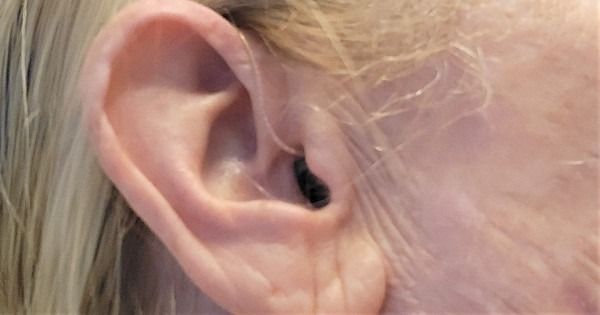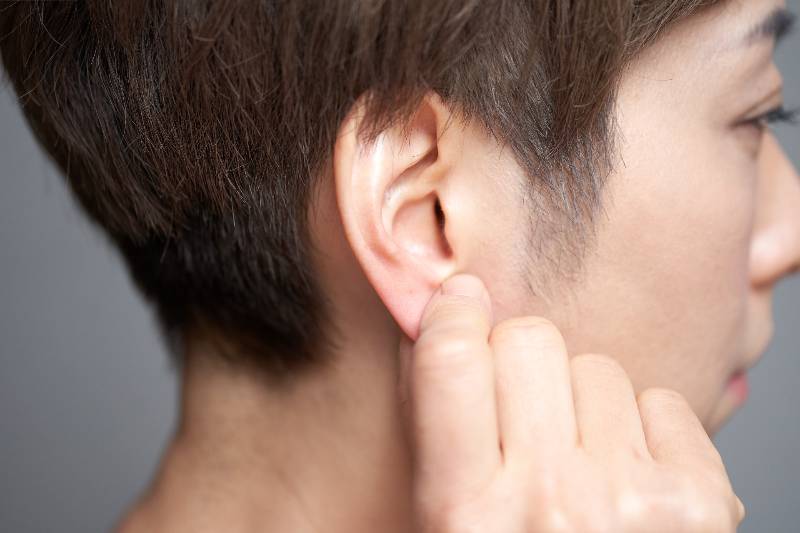Introduction
Hello everyone, today we are going to talk about a topic that affects many individuals and families, but is often not talked about – congenital hearing loss. You may also know it by other names such as hereditary hearing loss or inherited hearing loss.
There are different types of congenital hearing loss, some of which are caused by genetic factors, while others can be the result of maternal infections or other environmental factors. One type is sensorineural hearing loss, which is caused by damage to the inner ear or auditory nerve. Another type is conductive hearing loss, which occurs when there is a problem in the ear canal, ear drum or middle ear.
The symptoms of congenital hearing loss can vary, depending on the type and severity. Some of the common symptoms include difficulty hearing in noisy environments, muffled speech, and needing to turn up the volume on televisions or radios. Children with congenital hearing loss may also have difficulty with speech and language development.
There are different treatment options available for congenital hearing loss, including hearing aids, cochlear implants, and surgery. The choice of treatment will depend on the individual and the type and severity of their hearing loss. Early intervention, such as speech therapy and sign language, is also important for children with congenital hearing loss.
Early intervention is crucial for children with congenital hearing loss, as it can greatly impact their speech and language development. The earlier the hearing loss is detected, the sooner a child can receive the support and treatment they need.
There is ongoing research into the causes, treatments and interventions for congenital hearing loss. This is important not only for improving the lives of those affected by congenital hearing loss, but also for increasing our understanding of the auditory system and the brain. By continuing to research this topic, we hope to find new and innovative ways to help individuals with congenital hearing loss lead fulfilling lives.
Congenital Hearing Loss – synonyms
The synonyms for congenital hearing loss include:- Inherited hearing loss
- Hereditary hearing loss
- Birth deafness
- Familial hearing loss
- Congenital deafness
- Inherited deafness
- Birth hearing loss
- Familial deafness.
Congenital Hearing Loss – what are the types
Hi everyone, today we’re going to talk about the different types of congenital hearing loss. As you may know, congenital hearing loss is hearing loss that is present at birth or develops in the first few months of life. Understanding the different types can help in getting the right diagnosis and treatment.
One of the most common types of congenital hearing loss is sensorineural hearing loss. This type of hearing loss occurs when there is damage to the inner ear or auditory nerve. It can be caused by genetic factors, exposure to high noise levels, or certain infections during pregnancy.
Sensorineural hearing loss can range from mild to severe and can affect one or both ears.
Another type of congenital hearing loss is conductive hearing loss. This type occurs when there is a problem in the ear canal, ear drum, or middle ear that affects the ability to hear sounds. This type of hearing loss can be caused by a number of factors, including birth defects, fluid buildup in the middle ear, or infections. Conductive hearing loss can also range from mild to severe and can affect one or both ears.
Finally, there is a type of hearing loss called mixed hearing loss, which is a combination of sensorineural and conductive hearing loss. This type occurs when there is both inner ear damage and a problem in the outer or middle ear. Mixed hearing loss can be challenging to diagnose and treat as it involves multiple issues affecting hearing.
In conclusion, understanding the different types of congenital hearing loss is important in getting the right diagnosis and treatment. From sensorineural to conductive to mixed hearing loss, each type has its own unique causes and treatment options. By working with healthcare professionals, individuals with congenital hearing loss can receive the support and care they need to lead fulfilling lives.Top of Form
Congenital Hearing Loss – What are the symptoms
Knowing the symptoms can help in early detection and treatment of this condition.
One of the most common symptoms of congenital hearing loss is difficulty hearing in noisy environments. This can include difficulty hearing speech in places with background noise, such as restaurants or crowded events. Children with congenital hearing loss may also have difficulty hearing in school or during playtime with friends.
Another symptom of congenital hearing loss is muffled speech. Individuals with this condition may have trouble hearing speech sounds, especially if they are in a noisy environment. This can make it difficult to understand what others are saying, especially in noisy places.
A third symptom of congenital hearing loss is the need to turn up the volume on televisions or radios. If an individual needs to turn up the volume more than what is comfortable for others, it may be a sign of hearing loss. This is especially important to watch for in children, who may not be able to express their difficulty hearing.
Lastly, children with congenital hearing loss may have difficulty with speech and language development. This can include difficulty with pronunciation, difficulty following instructions, and difficulty understanding what others are saying. Early intervention, such as speech therapy, can help children with congenital hearing loss develop their speech and language skills.
In conclusion, the symptoms of congenital hearing loss can vary, but some of the most common include difficulty hearing in noisy environments, muffled speech, and the need to turn up the volume on televisions or radios. Early detection and treatment can help individuals with congenital hearing loss lead fulfilling lives.
Congenital Hearing Loss – Treatment Options
Knowing the different options can help individuals with this condition get the support and care they need.
One of the most common treatments for congenital hearing loss is the use of hearing aids. Hearing aids are small devices that are worn in or around the ear and amplify sounds so that they are easier to hear. Hearing aids come in many different styles and can be custom-fit to an individual’s needs.
Another treatment option for congenital hearing loss is cochlear implants. Cochlear implants are devices that are surgically implanted in the inner ear to help stimulate the auditory nerve. This allows individuals with congenital hearing loss to hear sounds that they would not be able to hear with a hearing aid alone.
For individuals with conductive hearing loss, surgery may be an option to repair any damage to the ear or to remove any obstructions that may be blocking sound from reaching the inner ear. Surgery can be effective in restoring hearing for some individuals with conductive hearing loss.
In addition to medical treatments, there are also a number of therapies and support services available for individuals with congenital hearing loss. These can include speech therapy, sign language classes, and support groups for individuals and families affected by hearing loss. Early intervention and support can help individuals with congenital hearing loss lead fulfilling lives and reach their full potential.
In conclusion, there are many different treatment options available for individuals with congenital hearing loss. From hearing aids and cochlear implants to surgery and support services, there is help available for individuals and families affected by this condition. By working with healthcare professionals, individuals with congenital hearing loss can receive the support and care they need to lead fulfilling lives.
Congenital Hearing Loss – Early intervention
One of the most important early interventions for congenital hearing loss is early detection. This can be done through newborn hearing screenings, which are now routine in many countries. Early detection can help ensure that children with hearing loss receive the support and treatment they need as soon as possible.
Another early intervention for congenital hearing loss is speech therapy. Speech therapy can help children with congenital hearing loss develop their speech and language skills, which can be affected by this condition. Speech therapists can work with children and their families to develop strategies for improving communication and language development.
For children with congenital hearing loss, it is also important to start using hearing aids or cochlear implants as soon as possible. These devices can help children hear sounds and speech that they would not be able to hear otherwise. Early use of these devices can help improve speech and language development, as well as social and emotional development.
In addition to medical and therapeutic interventions, it is also important for families of children with congenital hearing loss to get support and education. This can include support groups, educational resources, and advocacy organizations. These resources can help families understand and cope with their child’s hearing loss, and connect them with other families and individuals who have been affected by this condition.
In conclusion, early intervention is crucial for individuals with congenital hearing loss. From early detection and speech therapy to the use of hearing aids and cochlear implants, there are many different ways to support children and families affected by this condition. With the right support and care, individuals with congenital hearing loss can lead fulfilling lives and reach their full potential.
VIVALIFER Tinnitus Relief for Ringing Ears
Experience relief from tinnitus with this effective supplement specifically designed to alleviate symptoms such as buzzing, clicking, and other auditory disturbances. Bid farewell to the perplexing sounds in your ears and regain peace of mind.
Enhance your concentration and cognitive abilities with this tinnitus relief supplement. By reducing the interference caused by tinnitus, it helps improve memory and concentration, minimizing the risk of memory impairment and allowing you to think without interruption.
Promote a sense of calmness in your nervous system with the advanced formula of this tinnitus treatment supplement. It works by improving blood circulation, alleviating headaches, and reducing sensitivity to ear noise, providing a soothing effect for your overall well-being.
Congenital Hearing Loss – avenues on Research
Research in this area is important for improving treatments and finding new ways to support individuals with this condition.
One current avenue of research for congenital hearing loss is improving existing treatments, such as hearing aids and cochlear implants. Researchers are working to develop new technologies and improve the design of these devices to make them more effective and easier to use. This research is helping individuals with congenital hearing loss hear sounds and speech more clearly and easily.
Another avenue of research for congenital hearing loss is exploring the underlying causes of this condition. Researchers are studying genetics, environmental factors, and other factors that may contribute to congenital hearing loss. This research may lead to new treatments and ways to prevent this condition in the future.
In addition to improving existing treatments and exploring the causes of congenital hearing loss, researchers are also exploring new treatment options. For example, some researchers are investigating the use of stem cells to treat hearing loss, which may lead to new, regenerative treatments for this condition in the future.
Another important area of research for congenital hearing loss is improving early intervention and support for individuals and families affected by this condition. This can include exploring new approaches to speech therapy, developing educational resources and support groups, and working to raise awareness about the needs of individuals with congenital hearing loss.
In conclusion, there are many different avenues of research for congenital hearing loss. From improving existing treatments and exploring the underlying causes of this condition, to developing new treatments and improving support and education, researchers are working to help individuals and families affected by congenital hearing loss. With continued research and innovation, we can hope to improve the lives of individuals with this condition in the years to come.
Conclusion
We have covered a lot of important information, including the different types of congenital hearing loss, the symptoms, treatment options, early interventions, and current and future avenues of research.
Let’s start with the synonyms for congenital hearing loss. Some of the other terms that may be used to describe this condition include hereditary hearing loss, inherited hearing loss, and birth-related hearing loss.
We also talked about the different types of congenital hearing loss, including conductive hearing loss, sensorineural hearing loss, and mixed hearing loss. Understanding the type of hearing loss an individual has can help guide the choice of treatment and support.
We also discussed the symptoms of congenital hearing loss, which can include difficulty hearing sounds and speech, delayed speech and language development, and difficulty following conversations. Early detection and intervention can be crucial in addressing these symptoms and supporting individuals with congenital hearing loss.
We then discussed the treatment options for congenital hearing loss, which can include hearing aids, cochlear implants, speech therapy, and other medical treatments. The best treatment option will depend on the type of hearing loss and the individual’s specific needs.
We also talked about the importance of early intervention for individuals with congenital hearing loss. Early detection, speech therapy, and the use of hearing aids or cochlear implants can all help improve speech and language development, as well as social and emotional development.
Finally, we discussed the current and future avenues of research for congenital hearing loss. This can include improving existing treatments, exploring the underlying causes of this condition, developing new treatments, and improving support and education for individuals and families affected by congenital hearing loss.
In conclusion, congenital hearing loss is a complex and multifaceted condition that affects individuals and families in many different ways. However, with the right support and care, individuals with congenital hearing loss can lead fulfilling lives and reach their full potential.
Understanding the different types, symptoms, treatment options, and early interventions can be an important step in supporting those affected by this condition. With continued research and innovation, we can hope to improve the lives of individuals with congenital hearing loss in the years to come.








